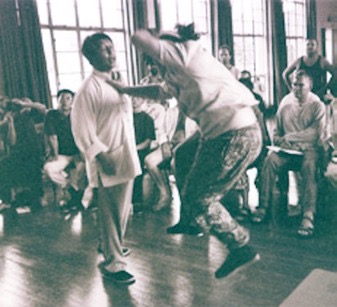Workshop: Inside Taijiquan - Standing Taiji 37 postures to develop internal forces
Date: Sunday 6 Sept
Time: 10am – 4.30pm
Venue: Colman Redland Centre, Croydon Rd, Reigate, Surrey RH2 0NA
Fees & Details: see below
Taiji 37 - Develop Internal Forces in Taijiquan
Taiji 37 or ‘Taiji SaQi’ (SaQi is the way ‘37’ is pronounced in the NingBo dialect), also called Nanpai or Southern School Taiji, is a series of standing postures which are the basis of techniques from which all modern Taiji forms and styles developed.
Poetry of the Nanpai School of Taiji evokes a mysterious and enigmatic image, of being invisible and without form, meaning that really there is no Taiji Form as such, only standing postures, stances that can naturally flow from one to another through spontaneous movement.
Taiji is after all based on Yin and Yang and can be considered to be the study of change, highly relevant in a rapidly changing modern world.
Historically, the prerequisite foundation for studying Taijiquan was to develop Taiji forces through these standing postures. Prior to the widespread advent of modern weapons, Taiji was created as a martial art and used for combat. Fighters practised to activate their dantian, then, when dantian force flowed freely through their energy channels, skilled fighters could project this force out of their bodies and use it to fight opponents, even at a distance. Today, Taijiquan has shifted towards a more health-orientated purpose, but the forces used for health and healing are exactly the same.

The Taiji 37 Postures comprise a much more detailed and concentrated method of study and practice of the internal content of Taiji than the practice of Form, wherin the participants tend to move on to the next “place” too rapidly to develop internal forces. Each Posture has its own specific spontaneous movement, which manifests as a result of the appropriate mental attitude, the right level of concentration and a correct posture. When practised in this way the postures stretch and open different energy channels and activate the three qi-circulations, helping to expel pathogenic factors (binqi) from the body. With further exercise, the spontaneous movement becomes more refined and internalised. Students can learn to control and guide this spontaneous movement force through the cultivation of strongly concentrated mental force.
The function of these techniques is to awaken and activate the dantian (energy centre) and thus cultivate Taijijin (Taiji forces), primary of which are vibration force, spontaneous movement force, and mental force. These forces are innate to everyone but in most people they are dormant. Many practitioners of Taijiquan have never experienced the sensation of movement of their inner energy and do not know how to discover and develop these Taijijin.
With training these Taiji forces can be used for self-healing and even for the treatment of others. Practising Taiji has a healing effect. Most people think that Taijiquan improves their health because it activates the qi circulation. However, the main reason is because it expels binqi (negative, stale, stagnant and potentially illness causing factors). Pushing the binqi out of the body through the meridians allows the qi to circulate more freely again, removing blockages in the energy channels and optimising the circulation of the internal vital energy or life force, correcting and regulating bodily functions and improving the quality of health and wellbeing. This practice can produce strong and rapid changes in the body and the internal energy system, clearing stale and negative factors from the body at all four levels; physical, energetic, mental and spiritual, leaving one cleansed, revitalised, invigorated and lightened.
It is also enjoyable to practice ;-)
Come and try it with us:-
The day is open to all, but Advance booking to ensure places is recommended for non-college students.
Level: All
Fees: £60 all day, £30 am or pm session - payable on the day:
Times: 10am ≈ 1pm: Lunch break ≈ 1pm - 2pm 2pm ≈ 4.30pm
Bring a blanket for floor exercises and /or Meditation:
Tea is provided but you must B.Y.O. lunches or go out for lunch